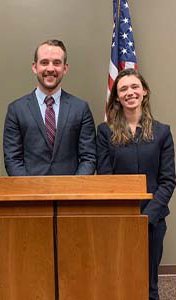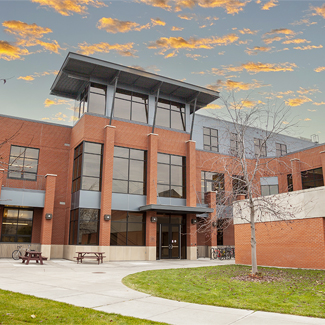UM Environmental Moot Court Team Performs Well at National Quarterfinals

University of Montana Blewett School of Law team members Malcolm Gilbert and Liz Forster advanced to the Jeffrey G. Miller National Environmental Moot Court Competition quarterfinals this year, beating out 27 teams from around the country. This year's competition was held February 23-26, and was hosted by Pace University's Elisabeth Haub School of Law.
In the second preliminary round, Liz Forster won best oralist. The team also prepared a well-received practice-level federal appellate brief on a complicated issue regarding water pollution regulation under the Clean Water Act.
This year presented a significant challenge for students and coaches, who were practicing in person but competing virtually, due to lingering concerns over COVID-19. To address this hybrid situation, practices were held partly in person and remotely via Zoom.
The competition was held completely over Zoom, but the students used the law school's moot courtroom as their Zoom studio.
"Setting up the moot courtroom as a Zoom studio was a little rough at first," said coach Rebecca Smith, "but the students creatively adapted to it and ultimately gave flawless virtual presentations from that space. In fact, several competition judges remarked that they loved the use of the lectern and moot courtroom as a way to present a more professional oral argument over Zoom."
Again this year Zoom practice sessions also had a silver lining in that the team was able to bring in guest judges from outside Missoula, including lawyers from Alaska, Washington state, Idaho (Boise and Moscow) and Helena.
Coach Smith said that this was so helpful to the students that she plans to continue to bring in remote guest judges in the future.
"Overall, the Montana team worked tirelessly, mastered a very complicated federal environmental statute and performed as well as, or better than, every other team they confronted at the competition," said Smith. "In particular, the students' understanding of the Clean Water Act — and their skills in directly answering questions with thoughtful and thorough legal arguments — surpassed every other team we encountered."
All three team members now possess the skills necessary to prepare and present competent and skillful briefing and oral argument in a federal appeals court remotely or in person.
